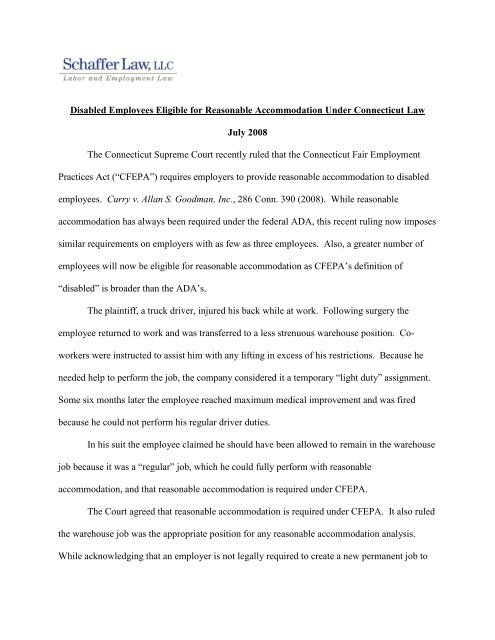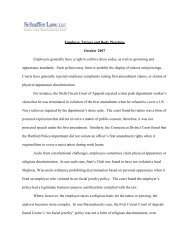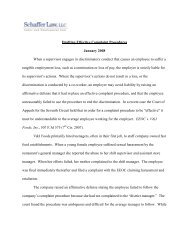Disabled Employees Eligible for Reasonable Accommodation ...
Disabled Employees Eligible for Reasonable Accommodation ...
Disabled Employees Eligible for Reasonable Accommodation ...
Create successful ePaper yourself
Turn your PDF publications into a flip-book with our unique Google optimized e-Paper software.
<strong>Disabled</strong> <strong>Employees</strong> <strong>Eligible</strong> <strong>for</strong> <strong>Reasonable</strong> <strong>Accommodation</strong> Under Connecticut Law<br />
July 2008<br />
The Connecticut Supreme Court recently ruled that the Connecticut Fair Employment<br />
Practices Act (“CFEPA”) requires employers to provide reasonable accommodation to disabled<br />
employees. Curry v. Allan S. Goodman, Inc., 286 Conn. 390 (2008). While reasonable<br />
accommodation has always been required under the federal ADA, this recent ruling now imposes<br />
similar requirements on employers with as few as three employees. Also, a greater number of<br />
employees will now be eligible <strong>for</strong> reasonable accommodation as CFEPA’s definition of<br />
“disabled” is broader than the ADA’s.<br />
The plaintiff, a truck driver, injured his back while at work. Following surgery the<br />
employee returned to work and was transferred to a less strenuous warehouse position. Coworkers<br />
were instructed to assist him with any lifting in excess of his restrictions. Because he<br />
needed help to per<strong>for</strong>m the job, the company considered it a temporary “light duty” assignment.<br />
Some six months later the employee reached maximum medical improvement and was fired<br />
because he could not per<strong>for</strong>m his regular driver duties.<br />
In his suit the employee claimed he should have been allowed to remain in the warehouse<br />
job because it was a “regular” job, which he could fully per<strong>for</strong>m with reasonable<br />
accommodation, and that reasonable accommodation is required under CFEPA.<br />
The Court agreed that reasonable accommodation is required under CFEPA. It also ruled<br />
the warehouse job was the appropriate position <strong>for</strong> any reasonable accommodation analysis.<br />
While acknowledging that an employer is not legally required to create a new permanent job to
accommodate a disability, it found the warehouse job was an existing “regular” job that the<br />
employee was potentially eligible to occupy under the terms of a labor agreement. It further<br />
stated that an employer can not automatically categorize any need <strong>for</strong> accommodation as “light<br />
duty” and then fire an employee whose need <strong>for</strong> accommodation becomes permanent. Instead,<br />
employers must engage in an interactive discussion to determine if there are any regular vacant<br />
positions that can be per<strong>for</strong>med with reasonable accommodation.<br />
Given the wider application of the law in this area, employers should review their<br />
policies and handbooks to ensure any transfer rights are clearly spelled out, and that employees<br />
understand the procedure <strong>for</strong> making accommodation requests. Further, supervisors should be<br />
trained on how to spot potential accommodation needs and deal with employee requests.<br />
For more in<strong>for</strong>mation contact scott@schaffer-law.com or (860) 216-1965.<br />
www.schaffer-law.com<br />
2





